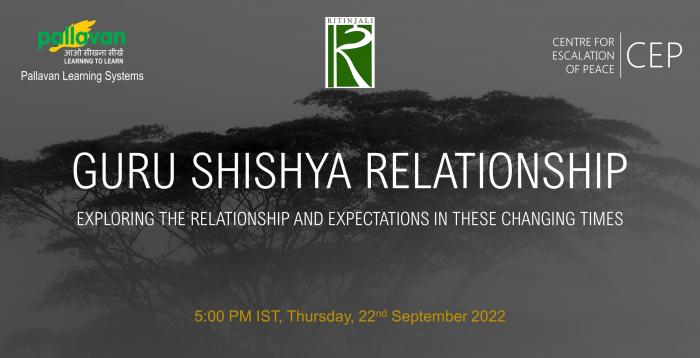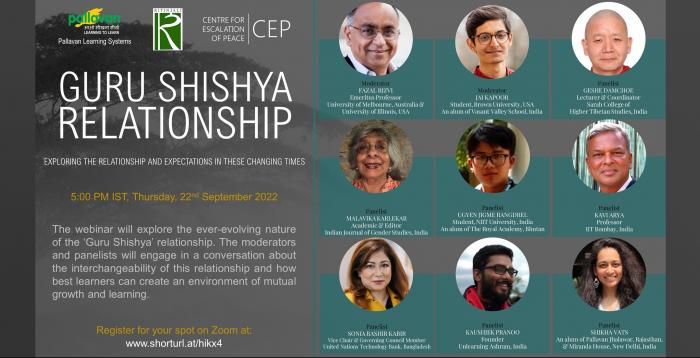September 2022: Guru Shishya Relationship: Exploring the Relationship and Expectations in these Changing Times
This 9th Webinar organised by Pallavan Learning Systems, in association with Ritinjali and Centre for Escalation of Peace, explored the ever-evolving nature of the ‘Guru Shishya’ relationship. The ‘Guru -Shishya’ relationship has undergone significant changes over the course of time. With every major revolution, be it agrarian, industrial, scientific or technological, we are constantly exploring the ever-changing facets of this ‘Guru Shishya’ relationship. Since the breakout of COVID-19 pandemic, this relationship has experienced many challenges. Learnings from these challenges define a whole new spectrum of knowledge-transfer and understanding. One major shift has been the advent of online platforms and the engagement of learning being primarily online without any in-person interaction between teachers and students.
The webinar was moderated by Dr. Fazal Rizvi and Jai Kapoor. The panel consisted of the following seven speakers: Ven Geshe Tenzin Damchoe, Prof Malavika Karlekar, Ugyen Jigme Rangdrel, Dr. Kavi Arya, Sonia Bashir Kabir, Kaushiek Pranoo, and Shikha Vats. The webinar was attended by a total of 162, from various countries including Afghanistan, Bangladesh, Bhutan, India, and the United States. The audience members had a diverse range of occupations such as analysts, counsellors, doctors, editors, teachers, therapists, writers, and a large number from the field of education. The moderators and panellists engaged in a conversation about the interchangeability of the Guru Shishya relationship and how best learners can create an environment of mutual growth and learning. The hour and a half proved to be far too short for the lively discussion, that included active engagement from the audience and a rigour debate among the panellists.
What emerged was the continued importance of this vital relationship, that must remain every dynamic, and be agile enough to adapt and respond to cultures, contexts, as well as individual choices. The panel largely agreed that the traditionally hierarchical nature of this relationship (as it has been understood in the Indian and South East Asian context) must change to allow for osmosis and learning between both sides, with the understanding that a true ‘guru’ is also always a learner. There was general agreement that all of us must look both inwards and outwards for sources of knowledge, that may include our own thoughts and emotions, nature, friends and family, and of course those that play more formal roles as teachers. The importance of the quality of the relationship, the dimension of vulnerability between the actors, and assumptions about ‘gurus’ being conflated with the moral good were all discussed.
A large part of the discussion focussed on the need to break down and critically examine all aspects of this relationship, that would benefit from explicit analysis. While acknowledging the danger of essentialising, this examination could address assumptions about the roles being played and by who - such as the impact of a largely patriarchal discourse on society and even religion; assumptions about the learning process and what this includes - such as creativity, criticality, agency, obedience and authority; and assumptions about the end goal such as practical versus esoteric knowledge, morality and truth. By far the largest and most galvanising topic of discussion was the role of technology, Artificial Intelligence (AI), and robotics – and how these most recent developments may impact and be impacted by the Guru Shishya relationship. With the Covid pandemic acting as a catalyst, the stereotypical and assumed roles of Guru and Shishya were significantly disrupted around the world. In today’s complex and transient world, it has become increasingly apparent that there are no clear boundaries between who is a Guru and who is a Shishya. All of us are constantly learning from one another, so much so that we can simultaneously don the roles of both. That is why, perhaps, it makes more sense to move away from the dichotomy of imparter and receiver, and instead focus on the process of learning taking place in a specific context.
The webinar drew to a close with observations from two selected members from the audience, Vidya Shah and Swapan Seth. Vidya Shah brought the discussion full circle by expressing the fact that for many people in the creative industry, such as artists and musicians, the Guru Shishya relationship continues with a consistent and often slavish commitment to the linearity of tradition. She stated that when you are attached to schools of systematic learning, it can be difficult to see the disruptions. This further highlighted the importance of culture and context that might colour the interpretation of the Guru Shishya relationship. Swapan Seth expressed that he did not believe that there is a clear binary between the roles, and especially highlighted the changing authority of age.
The webinar ended with the conclusion that this is a vast topic that requires continued study and debate, and that easy answers are unlikely. We hope that this discussion was as interesting and exciting for the audience as it was for our team and we look forward to seeing you again next time.
To read the full report, please click here. You can also watch the full webinar video at this link.
MODERATORS AND PANELISTS
Moderator: FAZAL RIZVI
Dr. Fazal Rizvi is an Emeritus Professor at the University of Melbourne and at the University of Illinois, Urbana-Champaign. Rizvi's disciplinary background is in Philosophy, but much of his research has addressed issues in education policy. Recently his research has focused on issues of identity, culture; global mobility of students; and theories of globalization and the internationalization of higher education.
Moderator: JAI KAPOOR
Jai Kapoor is a former student of Vasant Valley School. He is presently studying Mathematics and Economics at Brown University, USA. He is particularly interested in the shifts of the learning process in today’s world, with the blurring of lines between the Guru and the Shishya, especially with the rapid progress of technology.
Panelist: GESHE DAMCHOE
Ven Geshe Tenzin Damchoe completed his B. Com at St. Philomena’s College of Mysore University. He studied Buddhist Philosophy at Buddhist Dialectic School at Dharamsala and received a Geshe degree (Ph.D.) from Drepung Loseling Monastery, India. He is a visiting scholar at Earlham College, USA, Tibet Fund, USA, and Oxford University, England. At present he is engaged as lecturer and coordinator at the Sarah College of Higher Tibetan Studies, Dharamsala, India.
Panelist: MALAVIKA KARLEKARE
Prof Malavika Karlekar is Editor of Indian Journal of Gender Studies and Curator of Re-presenting Indian Women: A Visual Documentary, 1875-1947 and of the annual calendar based on archival photographs of women, all at Centre for Women’s Development Studies, New Delhi. She has authored several books and is also Editor of the Women and Photography, the online newsletter of the Alkazi Foundation for the Arts. Educated at the Universities of Delhi and Oxford, Karlekar has been a university teacher and researcher. Since 2001 she has been writing on archival photographs, treating them as material objects that can help in understanding social relationships, cultural paradigms and changes in people's lives.
Panelist: UGYEN JIGME RANGDREL
Ugyen Jigme Rangdrel is an alumni of The Royal Academy, Paro, Bhutan. He is currently pursuing computer science and engineering at NIIT University, Neemrana, Rajasthan, India. He is a passionate learner who loves to explore space science and emerging technologies. In future, he aspires to expand the cybersecurity industries in Bhutan and worldwide.
Panelist: KAVI ARYA
Dr. Kavi Arya is Professor of Computer Science & Engineering at the Indian Institute of Technology (Bombay). He did his B.Sc.(Hons.) in Computing Science from Imperial College of Science & Technology (UK) and M.Sc.(Hons.)/Ph.D. in Computation from University of Oxford. He worked in various positions in industry before coming to IIT Bombay in 2000. He is empaneled on high-level Govt. committees on IT Advisory Boards in Industry and is on Governing Council and Academic councils of several universities.
At IIT Bombay Prof. Arya is Principal Investigator of the e-Yantra Project popularizing "Project Based Learning" using robotics in engineering colleges.
Panelist: SONIA BASHIR KABIR
Educated and trained in Silicon Valley, Sonia lived for 20 years in the Valley and worked for Fortune 500 companies Sun Microsystems & Oracle. She relocated to Bangladesh and has served as Director, business development for Microsoft South East Asia New Markets, Country Director for Dell Bangladesh and Managing Director of Microsoft for Bangladesh, Myanmar, Nepal, Bhutan & Laos.
Currently Sonia is Vice Chair & Governing Council Member of United Nations Technology Bank. She is also the Founder of SBK Tech Ventures, a licensed Venture Capital (VC) Fund and the Founder of SBK Foundation, a not for profit licensed Micro Finance Institute (MFI) which empowers rural communities with access to technology and digital lending.
Panelist: KAUSHIEK PRANOO
Kaushiek Pranoo is the founder of Unlearning Ashram, an initiative offering facilitated spaces that empower human transformation towards co-creating a more inclusive, balanced and conscious world. Exploring through the lenses of yoga philosophy, decolonization and holistic unlearning pedagogies, his work is an invitation for people to slow down and closely re-examine every aspect of our lives so that we may recognize, re-imagine and re-design our lives into a more meaningful, conscious and joyful experience that can transform not just ourselves, but also relationships and help reshape this world. For over a decade he has facilitated spaces and worked with diverse groups of people and projects across the country around alternative education, youth leadership, wellness, yoga and more.
Panelist: SHIKHA VATS
Shikha Vats is a former student of Pallavan School in Jhalawar, Rajasthan. She completed her graduation from Miranda House and is looking to do further studies in creative writing. She sees the world through the intersectional feminist lens. She aims to deconstruct patriarchy through her work for an equitable society.
To read the full report, please click here. You can also watch the full webinar video at this link.
To receive regular updates, subscribe to our Pallavan World and PLS Newsletter.
Should you have any feedback and suggestions, please feel free to share with us.




